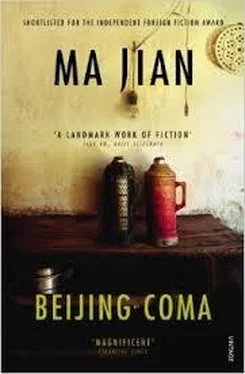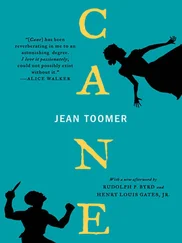I remember letting off firecrackers when I was a kid. The loud bangs they made left me deaf for days. I can see red and yellow paper from exploded firecrackers scattered across a pavement. I’m standing in a lane I used to walk down as a child. Further along, I spot a charred biscuit tin. When I press my foot into the paper ashes inside, they fly up and dance in the breeze. I walk on and come to a locust tree. On the grey wall behind I see the shadow of its branches swaying in the wind. An old man with a red armband is squatting beneath the tree. No, he’s not squatting — he’s sitting on a fold-up stool.
‘Keep walking. You know these lanes very well…’
I keep going, turn right and arrive outside Lulu’s window. The building’s red bricks are dry and crumbly. All the plaster has peeled off, apart from one large patch that hangs on the wall like a piece of old cloth.
‘Go back to your childhood. Go deeper and deeper. Keep going. Don’t be afraid. Use your thoughts to ram your way through…’
I hesitate for a moment, because I know that Lulu’s family moved out of that ground-floor flat years ago. I glance at the gap below the windowsill. I found an old key once and tried to sell it, but no ironmonger would buy it because it was made out of cheap metal, not copper. So I scraped out a hole underneath Lulu’s windowsill and hid the key inside. I move closer to the gap, wondering if the key is still there.
‘I can’t stay with you much longer. My energy is running out. You must hurry up.’
I clench every muscle in my body then ram my head through the wall and enter a great blackness. As shards of my past spin around me, the face of Granny Li, who was scalded to death by the Red Guards, suddenly appears before my eyes.
‘Look, he moved!’ my mother cries. ‘His mouth moved! Look, look! His lips twitched, at least three times.’
‘I can’t open his Eye of Heaven,’ the director says, removing his hand from my head. ‘He has very few memories left. I emitted strong electromagnetic waves, but the DNA of his pathological tissue is severely damaged. It will never be able to repair itself.’
‘The what of his tissue?’ my mother asks.
‘The DNA — it contains the genetic information which determines how our tissues develop and function. Sometimes damaged DNA can repair itself, allowing the tissue to regenerate, but his injury is too severe. It will take more than just qigong to cure him.’
‘But I saw his mouth move just now. That’s the first time any part of him has moved since he fell into the coma.’ My mother is even more excited than me.
‘I know. But if he’s going to make any further progress, he’ll need to take specific medication to strengthen his cells’ vitality. Unfortunately, the particular drug I’m thinking of isn’t available in China yet.’
‘He has a cousin in America. If you write down the name of the drug, I’ll ask him to send it to us.’
‘The drug can’t be bought in pharmacies. It has to be prescribed by a hospital physician. So unless you take your son abroad, you won’t be able to get hold of it.’
My mother falls silent.
Although the director has removed his hand from my head, my wound is still pulsating. The stimulated neurons there have packed into a tight ball which is emitting waves of light. I saw the director’s face in my mind, but unfortunately it seems he didn’t see me.
Everything goes dark. Granny Li and the hole below the windowsill disappear. Then a memory of me standing in a cold classroom wavers into focus. There’s an arithmetic question on the blackboard behind me, and a heap of brooms and dustpans stacked next to the door. I stare at the rays of sunlight on the concrete balcony of the classroom. The balcony is so stark and empty, it looks like a black and white photograph. What is the meaning of this image? Without the director to guide me, it’s impossible to decipher.
Blood from my brain flows into my limbs, then swishes back up again like the waves of a sea. My numb arms seem to want to move. I take a deep breath and, tense with excitement, try to wriggle my fingers.
Another male voice speaks. ‘The last paraplegic the director treated was able to stand up after just one session. The director has cured hundreds of invalids. He’s famous throughout Sichuan.’ He sounds like the assistant doctor. He’s wearing trainers, so I didn’t hear him walking in. His hands smell of soap. He’s pushing my chin down so that he can take a look at my tongue.
Without another word, the director gets up and leaves the room. How could he abandon me like this? He’s the only person in the world I can talk to. There are so many things I want to ask him.
‘But he could open his eyes when he came here, unlike your son,’ the assistant doctor continues. ‘There’s no patient the director cannot cure. So don’t worry. Your son will have another session tomorrow.’
Someone in the corridor cries out: ‘Chunhua! There’s a woman on the phone for you! You can take it down at reception.’
‘Tell her I’m busy!’ a nurse next to me shouts. Then she mumbles, ‘It’s probably my mother.’
‘Don’t touch that cable,’ a younger nurse says. I didn’t hear these two women walk in either.
‘It’s not all up to us, Auntie,’ the assistant doctor explains, scribbling something onto a sheet of paper. ‘Doctors are the broadcasting stations, and the patients are the radios. If the radios aren’t turned on, they won’t receive the broadcasts.’
‘Do you feed him through a tube?’ Chunhua asks.
‘Yes, I’ve brought the tube with me. You won’t need to buy him one.’ My mother is always worried the doctors will add unnecessary expenses to her bill.
‘The feeding tubes need to be regularly replaced, Auntie, or they’ll become infected,’ the assistant doctor says. ‘They only cost seven yuan each. Why not let us buy him a new one? Here are his transfusion bottles. He will be given a daily dose of three bottles of glucose solution and six bottles of nutrition fluid. The products are made locally. It’s a high-quality brand. It works out cheaper if you buy them from us rather than the pharmacy.’
‘Let’s have lunch at that Taiwanese beef noodle restaurant that’s opened down the road,’ Chunhua whispers to the young nurse.
‘Pass me that box of needles. Yes, that one.’ The young nurse moves closer to me and I catch the scent of her shampoo.
A voice calls out from the stairwell: ‘Chunhua! Someone on the phone for you again. It’s a man this time. Hurry up.’
‘All right, I’m coming, I’m coming…’ When Chunhua swirls round, a musky, feminine odour wafts out from between her legs.
Sensing my penis begin to enlarge, I quickly focus on the noises around me. The steel toecaps grinding against the concrete floor of the stairwell landing sound like metal spoons grating against a ceramic bowl.
My mother grabs a pillow and quickly pushes it between my legs to hide my erection from the young nurse.
‘We’re going to examine his cerebrospinal fluid this afternoon. We’ve put him down as an inpatient, so he’ll get a fifty-two-yuan discount…’
The doctor and nurse walk out of the room, leaving behind a confusion of smells.
I’m still locked inside my head. I keep seeing those black paper ashes rising from the charred biscuit tin. It’s a random image of little significance which, until now, has remained locked in some deep part of my brain. But if I can retrieve this lost memory, perhaps there are other more important ones which I can also reclaim.
The director told me that if I want to come out of my coma, I must make a deliberate effort to remember events I’ve chosen to forget. Before I return to my old life, I must first complete this inward journey into my past. Perhaps eventually I’ll be able to return to that hospital corridor and push my way out into the world once more.
Читать дальше












